
Carex nigra is a perennial species of plants in the family Cyperaceae native to wetlands of Europe, western Asia, north Africa, and eastern North America. Common names include common sedge, black sedge or smooth black sedge. The eastern limit of its range reaches central Siberia, Turkey and probably the Caucasus.
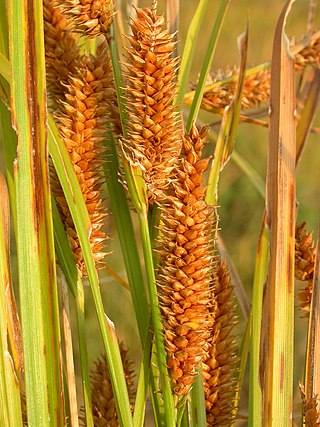
Carex utriculata is a species of sedge known as Northwest Territory sedge and common yellow lake sedge.

Carex brunnescens, the brownish sedge or green bog sedge, is a species of plant in the sedge family (Cyperaceae). It has a circumboreal distribution, and is native to North America and Eurasia. In the United States it is primarily found in the Northeast and Midwest extending south into the Appalachian Mountains, with disjunct populations westward in the Rocky Mountains. It has a wide-ranging natural habitat, is in found in forests, bogs, fens, and rock outcrops.

Carex arctata, known as drooping woodland sedge, is a species of sedge native to eastern North America. It is sometimes called black sedge, compressed sedge, or drooping wood sedge. It occurs from Manitoba to the Maritimes in Canada, south to northwestern North Carolina, and west to Minnesota. Carex arctata grows in bogs, hardwood forests, and spruce forests.
Carex davyi, or Davy's sedge, is a species of sedge that was first described by Kenneth Mackenzie in 1917. It is native to California.

Carex eburnea, known as ivory sedge, ebony sedge, and bristleleaf or bristle-leaved sedge, is a small and slender sedge native to North America, from Alaska and Newfoundland south to central Mexico.
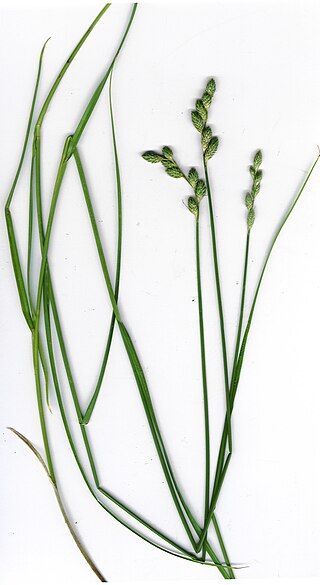
Carex longii, or Long's sedge, is a species of sedge found in North America that was first described by Kenneth Mackenzie in 1922.

Carex merritt-fernaldii, or Fernald's sedge, is a species of sedge from northeastern North America. It was first described by Kenneth Mackenzie in 1923. It is named after botanist Merritt Fernald.

Carex normalis, the greater straw sedge, is a species of sedge that was first described by Kenneth Mackenzie in 1919.
Carex projecta, the necklace sedge, is a species of sedge that was first described by Kenneth Mackenzie in 1908.
Carex wootonii, or Wooton's sedge, is a species of sedge that was first described by Kenneth Mackenzie in 1915. Wooton's Sedge is a perennial or rhizomatous geophyte and grows primarily in Subtropical Biomes.

Carex woodii, known as pretty sedge, is a species of sedge native to North America.

Carex bicknellii, known as Bicknell's sedge and copper-shouldered oval sedge, is a species of sedge native to North America. Carex bicknellii grows in small clumps with fewer than 25 flowering stems per clump. It is found in mesic to dry prairies, savannas, and open woodlands.
Carex albolutescens, known as greenish-white sedge or greenwhite sedge is a species of sedge native primarily to the lower Midwest and Eastern United States. C. albolutescens grows in wetlands, with an affinity toward acidic soils in swamps and woodlands.

Carex tenera, known as quill sedge, is a species of sedge native to the northern United States and Canada.
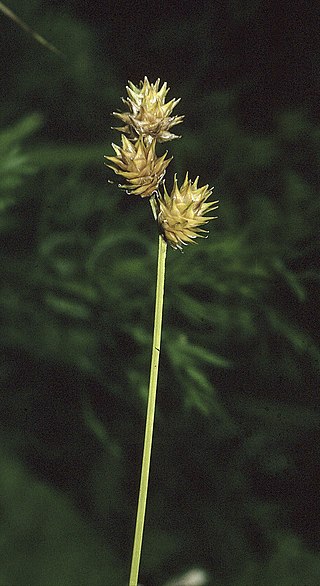
Carex straminea, known as eastern straw sedge, is a species of sedge native to North America.
Carex suberecta, known as prairie straw sedge, is a species of sedge native to North America.
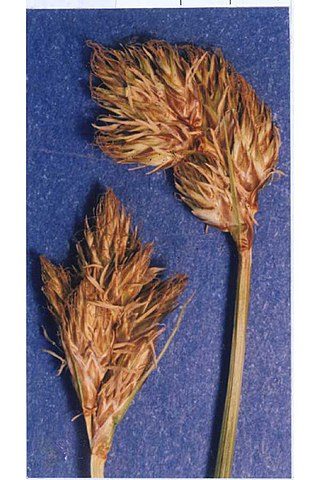
Carex arapahoensis, known as Arapaho sedge, is a species of sedge endemic to the western United States. It is found only in Colorado and Utah in alpine and subalpine habitat.

Carex viridula, known as little green sedge, green sedge, or greenish sedge, is a small flowering plant native to North America, Europe, Asia, and Morocco.
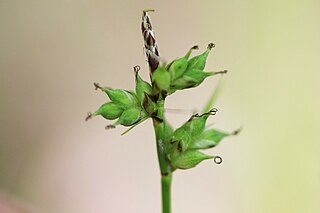
Carex peckii, Peck's sedge, Peck's oak sedge, or white-tinged sedge, is a species of sedge native to Canada and the United States.
















